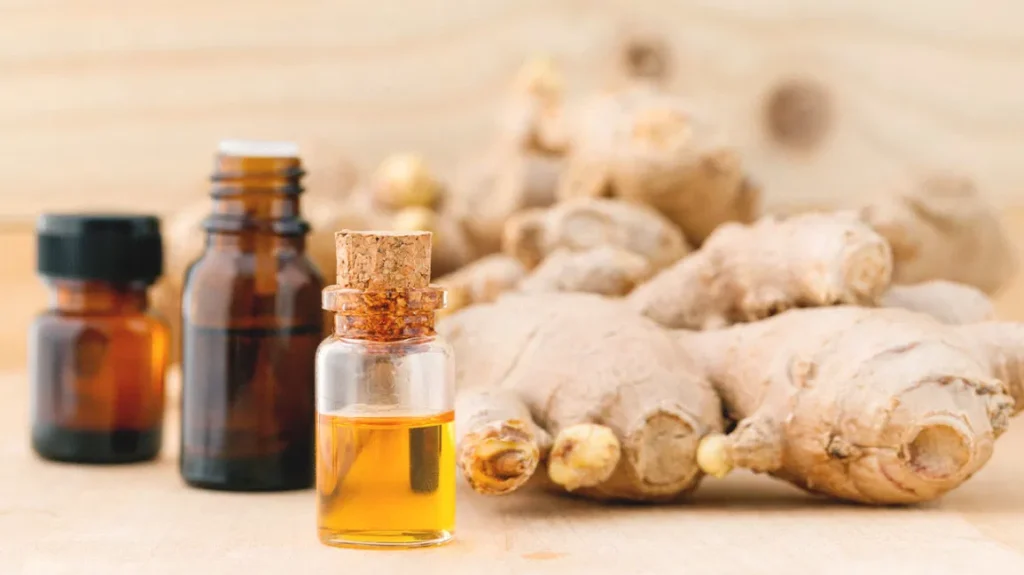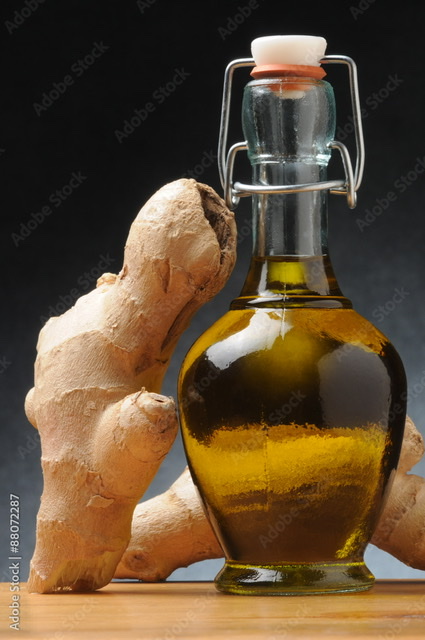Ginger and olive oil are said to have long been used in traditional medicine. They both have numerous health benefits that can’t be overlooked. In this article we’ll discuss ginger and olive oil separately and its health benefits.
Ginger
Ginger is a member of the same plant family that includes tumeric and cardamom. It can be found throughout the world especially in Asia and Africa. The scientific name of the plant is Zingiber officinale. The part of the plant that’s used for these purposes is called the rhizome. While it may look like a root, the rhizome is actually an underground stem off of which roots branch.
Ginger oil
Ginger oil is extracted from the ginger rhizome after a distillation process. Like other essential oils, it’s very concentrated.

Ginger oil has a distinct aroma that can be described as strong, warm, or spicy. As such, it’s often used for aromatherapy.
Olive oil
Olive oil comes from olives, the fruit of the olive tree. Olives are a traditional crop of the Mediterranean region. People make olive oil by pressing whole olives.

People use olive oil in cooking, cosmetics, medicine, soaps, and as a fuel for traditional lamps. Olive oil originally came from the Mediterranean, but today, it is popular around the world.
Benefits of Ginger and olive oil
Here are some health benefits of ginger olive oil are anecdotal. This means that they’re based off of personal reports or testimony as opposed to scientific studies.
Ginger oil
Ginger oil is anti inflammatory
Studies have begun to investigate the anti-inflammatory effects of ginger oil. Although many of these studies have been in animals, the results could have implications for a variety of conditions.
A study found that ginger essential oil had a protective effect on the kidneys of rats treated with the toxin cadmium. Ginger oil was found to be anti-inflammatory, preventing changes in kidney function markers or molecules associated with inflammation.
A 2016 study was performed in a rat model of rheumatoid arthritis. Investigators found that injecting ginger essential oil didn’t reduce acute joint swelling but significantly inhibited chronic joint swelling.
Lastly, a 2019 study looked into the effect of supplementing ginger extract into the diet of obese mice on a highly refined carbohydrate diet. The researchers found that high doses of ginger extract prevented increases in weight and decreased markers of inflammation.
Nausea
Inhaling the aroma from ginger oil has been used as a way to relieve nausea. Study results looking into this use have been mixed.
One 2017 study assessed the effectiveness of inhaling ginger oil to relieve postoperative nausea following abdominal surgery. Investigators found that participants that had inhaled ginger oil rated their levels of nausea and vomiting lower than those in the placebo group.
However, another study found conflicting results. Investigators compared levels of postoperative nausea in children inhaling a blend of essential oils (which included ginger) or placebo. They found that there was no difference in nausea between children inhaling the essential oil blend and children inhaling placebo.
Hair applications
Ginger oil or extract is sometimes included in shampoos or other hair products, as it’s believed to promote hair health and growth. But, little research has been performed on whether this is actually the case.
A 2013 study looked at the effect of 6-gingerol, an active ingredient in ginger oil, on hair growth in cultured cells and in mice. Instead of finding that 6-gingerol promoted hair growth, researchers actually found it suppressed hair growth, both in cultured hair follicles and in a mouse model.
- Other benefits of ginger
Ginger and ginger oil have also been used to help ease the following conditions:
* arthritis
* digestive upset
* colds
* migraines
Olive oil
Olive oil and inflammatory bowel disease
Olive oil also helps with inflammatory bowel disease. Inflammatory bowel disease (IBD) causes inflammation of the digestive tract. Ulcerative colitis and Crohn’s disease are types of IBD.
A 2019 review found that phenols in olive oil may help boost intestinal immunity and gut health by changing the microbes in the gut. This could be useful for people with colitis and other types of IBD. The authors noted that more human studies are needed to confirm these results.
Olive oil and the cardiovascular system
Olive oil is the main source of fat in the Mediterranean diet. People who consume this diet appear to have a higher life expectancy, including a lower chance of dying from cardiovascular diseases, compared with people who follow other diets. Some experts call it “the standard in preventive medicine.”
A 2018 study compared the number of cardiovascular events among people who consumed a Mediterranean diet, either with olive oil or nuts, or a low-fat diet.
People who consumed the Mediterranean diet, whether with olive oil or nuts, had a lower incidence of cardiovascular disease than those on the low-fat diet.
According to the authors of one 2018 review, the Food and Drug Administration (FDA) and the European Food Safety Authority recommend consuming around 20 grams (g) or two tablespoons (tbs) of extra virgin olive oil each day to reduce the risk of cardiovascular disease and inflammation.
Results of a 2017 study suggested that the polyphenols in extra virgin olive oil may offer protection from cardiovascular disease, atherosclerosis, stroke, brain dysfunction, and cancer. Polyphenols are a type of antioxidant.
Depression risk and olive oil
In 2013, a rodent study suggested that ingredients in extra virgin olive oil may help protect the nervous system and could be useful for treating depression and anxiety.
Two years before, scientists had found evidence that people who ate trans fats, which is an unhealthful fat that features in fast foods and premade baked goods, were more likely to have depression than those who consumed unsaturated fats, such as olive oil.
Olive Oil Is Rich in Healthy Monounsaturated Fats
Olive oil is the natural oil extracted from olives, the fruit of the olive tree.
About 14% of the oil is saturated fat, whereas 11% is polyunsaturated, such as omega-6 and omega-3 fatty acids.
But the predominant fatty acid in olive oil is a monounsaturated fat called oleic acid, making up 73% of the total oil content.
Studies suggest that oleic acid reduces inflammation and may even have beneficial effects on genes linked to cancer.
Monounsaturated fats are also quite resistant to high heat, making extra virgin olive oil a healthy choice for cooking.
Summary Olive oil is rich in monounsaturated oleic acid. This fatty
acid is believed to have many beneficial effects and is a healthy choice for
cooking.







1 comment